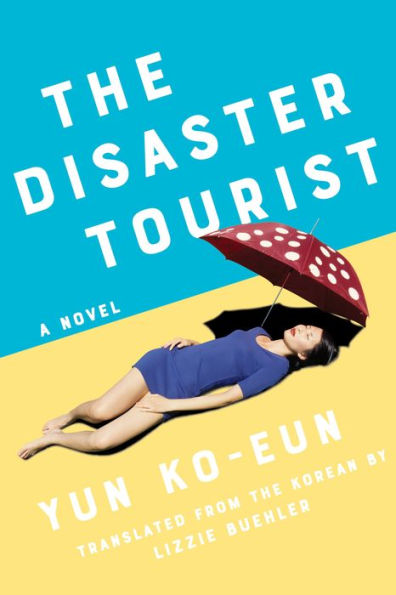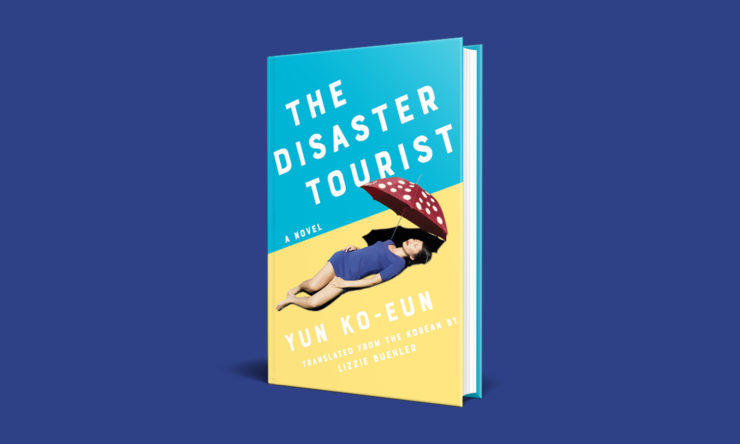The Disaster Tourist is a trim near-future speculative novel from Yun Ko-eun, the first of her novels to be translated and published in English. Ko Yona, our protagonist, has been an employee of the travel company Jungle for around ten years; Jungle creates “ethical” vacation packages to locations of catastrophe. Tsunami, earthquakes, volcanoes, radiation, prisons and asylums, mass killings: the humans involved and the sites of their trauma become the consumables offered in trade for tourists seeking that authentic experience and a bit of moral righteousness to assuage the guilt of rubbernecking.
But when Yona begins to experience sexual harassment from her boss and assumes this means she’s gotten an informal “yellow card”—implying she’s on her way out of the company—she attempts to resign. Instead of her resignation being accepted, she’s offered a ‘working vacation’ to check out one of their failing packages on the island of Mui and review it for cancellation. However, all is not as it seems on Mui, and Yona’s own complicity in the broader systems at work in Jungle’s interventions on local spaces begin to dreadfully evolve.
The Disaster Tourist is Yun Ko-eun’s second novel, originally published under the title『밤의 여행자들』 (Travelers of the Night) in 2013 in Korea. She is the winner of multiple significant awards including the Hankyoreh Literature Award and Kim Yong-ik Novel Prize, and has also written three short story collections (all of which I, frankly, would love to see translated as well).
Yun Ko-eun’s prose is economical and exacting—but also intensely atmospheric, especially as the novel unfolds to its grim conclusion. Realism, speculation, and a fairly entropic sense of the fantastic are all melded together. The translation by Lizzie Buehler dances with great facility across the novel’s scalpel-precise observational detail as well as the nightmare-logic of Yona’s unravelling situation. Each line of this packed volume does multiple layers of labor simultaneously: thematic, descriptive, philosophical, narrative. She wastes no words.
Buy the Book


The Disaster Tourist
The prose crosses seamlessly from handsome description, such as, “Standing in front of the volcano’s crater, the group took pictures, made wishes, and threw their flowers like they were bouquets. The bouquets drew an arc as they fell into the crater. To Yona, the whole action felt like neatly placing trash into its specific waste receptacle.” …to incisive summation of the goal of Jungle’s trips that hits like a punch to the stomach:
On a disaster trip, travelers’ reactions to their surroundings usually went through the following stages: shock à sympathy and compassion, and maybe discomfort à gratefulness for their own lives à a sense of responsibility and the feeling that they’d learned a lesson, and maybe an inkling of superiority for having survived. The stage someone reached depended on the person, but ultimately, adventures like these reinforced a fear of disasters and confirmed the fact that the tourist was, in fact, alive. Even though I came close to disaster, I escaped unscathed: those were the selfish words of solace you told yourself after returning home.
I’m used to finding one of those or the other in a book: either I get the atmospheric, unsettling, dreaming horror of dissolution or the efficient beauty of concise observation. It is extremely compelling (and awesome) to immerse myself into both techniques holding hands, with the result being a wildly, necessarily uncomfortable narrative about the effects of the systemic corruption of late capitalism on multiple scales. The novel is downright spooky, holding a mirror up to the individual reader: how do we participate, and what draws us to do so, and how are we all cogs in a great and overwhelming catastrophe?
The Disaster Tourist has multiple functional levels as a novel. We’ve got a narrative that at first seems quite mundane: the trip to Mui and the personal trauma of sexual assault from a superior, an HR department who advises her to drop it, and a rejected work resignation. Mui features sinkholes that were the site of a genocide around the 1960s and a dormant volcano; when Yona arrives and does the regular tour, she ends up bored. The trauma of the past re-enacted by locals feels like a gimmick and doesn’t get her emotions going. The affect being sold is no longer present. On her way home, though, she’s pickpocketed and separated from her tour group… and that’s when it starts to go off the rails.
The straightforward plot gets anything but straightforward as it dives into conspiracy, the dream-logic of a literal script being written for a disaster with real live (or dead) people as players, and so on. The nightmare feeling of dread ramps up abruptly with the experience of being adrift without papers on a small foreign island where nothing is quite as it seems. For example, the tour guide and then Jungle offices ignoring or redirecting her calls through weird labyrinths of “not my problem” gave me proverbial hives. Everyone’s bad dream of a travel experience and a work experience at once, summed up through gaslighting and abandonment.
Once she’s stranded, though, Yona gets roped into staging a catastrophe with the writer from her initial vacation and the resort manager. Bodies pile up, created through a variety of unsavory means short of what she considers murder, to be dumped in manmade sinkholes. But the situation is actually even worse than even that. The system assigns a role to everyone so no one is fully complicit in the violence, the destruction, the sacrifice for capital and the survival of some on the bones of others. And yet: everyone is culpable.
That theme is reflected from earlier in the mundane portion of the novel, though, like a ghost that comes out of the floorboards. After having experienced re-enactment of a genocide (which, ironically, her child later on mocks a recreation of my massacring ants), the teacher comments: “’Isn’t this the reason we’re on this trip? […] To avoid repeating history?’ The writer nodded his head.” The tourists repeat these justifications to themselves, about bearing witness and doing community service in the place they visit like digging a well (that later goes unused), but Yona gives the lie to all that. She’s there to evaluate if it makes them feel the affects for sale, no matter what it does to the local islanders and their situations.
The philosophical indictment of tourism, its industrial and often-imperial impulses, is nuanced and uncomfortable—and it stands in for systems of global capital at large. If there’s something to bridge solidarity across in this day and age, a shared story, it might be the destruction of the ecological system and the ways that trash, pollution, and capital circulate across the oceans… but affect different people and places quite fucking differently. (I was reminded of an interesting but upsetting critical book I read earlier this year, Christine L. Marran’s Ecology without Culture: Aesthetics for a Toxic World.)
Significant spoilers follow.
Yona isn’t always the most sympathetic protagonist—but she is deeply compelling and real as a human being who makes choices based on her own standpoint in life. And I sat the book down at Yona’s death, because the story is not done when it happens, and it takes a hell of a writer to kill the protagonist before the conclusion of the text. Yun Ko-eun is able to sustain the story after her lead character’s murder—her becoming Crocodile 75 in the script—and finally ends with a single, perfect line that refuses neat narrative tie-off for Yona as a human or object-character. I won’t spoil that one, it needs to be experienced on its own. The Disaster Tourist doesn’t resolve into a simple moral answer, or an easy experience of reading, but it does end on powerful affects and thematic questions to drag out into the world.
Whole paragraphs of this book are lodged in my brain. I can’t overstate how gripping the balance is between the scattered logic of a dissolving nightmare and the cutting precision of a trauma, especially at the end of the book. It’s unsettling and upsetting, leaving the reader chewing hard over the argument the text has made about our present moment and who we all are as participants in it. The logical, mundane story of travel, work, and evaluation of an experience falls apart so purposefully, in Yona’s case, to a boulder-rolling-down-a-hill inescapable distortion of the real. But her final act does, ultimately, save the undocumented families of the island from the actual natural disaster that overwhelms the planned massacre of the ‘false’ or unnatural disaster.
That doesn’t stop Jungle or the tourists who arrive on the newly-improved disaster vacation package to consume the tale of her tragic demise, though. Individual action is at once culpable and ineffective in the broader collapse of the global ecosystem around us. While there’s a blip of hope, the overall concluding tone is grimly thoughtful—leaving the reader with work to do, internally. And boy, do I love a book that makes me struggle at the end, sometimes. Compelling and twisty, provocative and economical: The Disaster Tourist has what I look for for a near-future speculative novel.
(Also, if you’re fresh picking up works in translation, but you dig the novels of folks like Jeff VanderMeer, this is a solid place to start expanding your reading habits. The world is huge, Anglo-American publishing represents a small fraction of the books available out there, and supporting brilliant novels in translation means we get more brilliant novels in translation.)
The Disaster Tourist is available from Counterpoint Press.
Lee Mandelo is a writer, critic, and editor whose primary fields of interest are speculative fiction and queer literature, especially when the two coincide. They have two books out, Beyond Binary: Genderqueer and Sexually Fluid Speculative Fiction and We Wuz Pushed: On Joanna Russ and Radical Truth-telling, and in the past have edited for publications like Strange Horizons Magazine. Other work has been featured in magazines such as Stone Telling, Clarkesworld, Apex, and Ideomancer.










